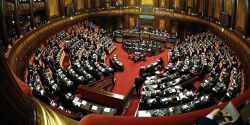Senate of Eflad (Pacifica)
Senate of Eflad Efladischer Sænat | |
|---|---|
| 47th Sænat | |
 | |
| History | |
| Established | 23 August 1840 |
| Preceded by | Parliament of the Kingdom of Eflad |
| Leadership | |
| Structure | |
Political groups | Government (216)
Opposition (212) |
| Elections | |
| Mixed-member proportional representation (MMP) | |
Last election | 02 April 2022 |
Next election | On or before 12 April 2026 |
| Meeting place | |
 | |
| Sænatorium Altstadt, Münnen, Eflad | |
The Sænat ("Senate") is the Efladian federal parliament. It is the only federal representative body that is directly elected by the Efladian people. The Sænat was established by Title III of the Constitution for the Republic of Eflad (Efladian Alman: Verfassung) in 1840 as one of the legislative bodies of Eflad and is therefore the historical successor to the Parliament of the Kingdom of Eflad.
The members of the Sænat are representatives of the Efladian people as a whole, are not bound by any orders or instructions and are only accountable to their electorate. The minimum legal number of members of the Sænat (Efladian Alman: Mitglied des Senats) is 370; however, due to the system of overhang and leveling seats the current 47th Sænat has a total of 428 members.
The Sænat is elected every four years by Efladian citizens aged 16 or over. Elections use a mixed-member proportional representation system which combines first-past-the-post elected seats with a proportional party list to ensure its composition mirrors the national popular vote. An early election is only possible in the cases of a prime minister not being elected in the course of 14 days after being nominated by the President (Art. XX), or if the Senate fails to confrm a motion of confidence of the prime minister (Art. YY).
The Sænat has several functions. It is the chief legislative body on the federal level. The individual states (Staat) of Eflad participate in legislative process through the Föderaler Konzil, a separate assembly. The Sænat also elects and oversees the prime minister, Eflad's head of government, and sets the government budget.
Since 1840, it has met in the Sænatorium building in Münnen. The Sænat also operates in multiple new government buildings in Selpe and has its own police force (the Sænatpolizei). The current President of the Sænat since 2022 is Jura Koef of the RE! The 47th Sænat has four vice leaders.
Role
Together with the Federal Council of Eflad it forms the legislative branch of the Efladian political system.
The Senate views the legislative role as its most important duty, focusing much of its efforts on analysing and modifying the government's legislative programme even though the executive branch usually initiates the majority of legislation. A significant part of this process is played by the committees (see below). Plenary sessions give members a venue for open discussion of the legislative matters that are before them, although they often draw a large audience only when substantial legislation is being debated.
The only federal representatives who are elected by the people are the senators, who additionally elect the Prime Minister and oversee the executive branch on matters of both fundamental policies and routine administration. Binding legislation, debates over public policy in public, inquiries, and direct questioning of the prime minister or cabinet ministers can all be used to curb executive power. For instance, the Senate may have a question session (Fragesitzung), during which a government official answers to a previously put in written inquiry by a member. During the question period, participants may pose relevant questions.

The inquiries might be about anything, from a significant policy to a problem facing a particular constituent. Over the past seventy years or so, the use of the question session has increased more than ever, with more than 20,000 questions being asked during the 2015-19 term. The opposition parties formally use their legislative authority to review the activities of the administration.
The Petition Committee also provides constituent services. Over 36,000 citizen complaints were received by the Petition Committee in 2013, and more than half of them were settled by negotiations. A Senate version of e-petitioner was created in 2005 as a test of the viability of online petitions. On the basis of a review after the system's official debut on September 1, 2007, the Senate switched to an updated system in 2012.